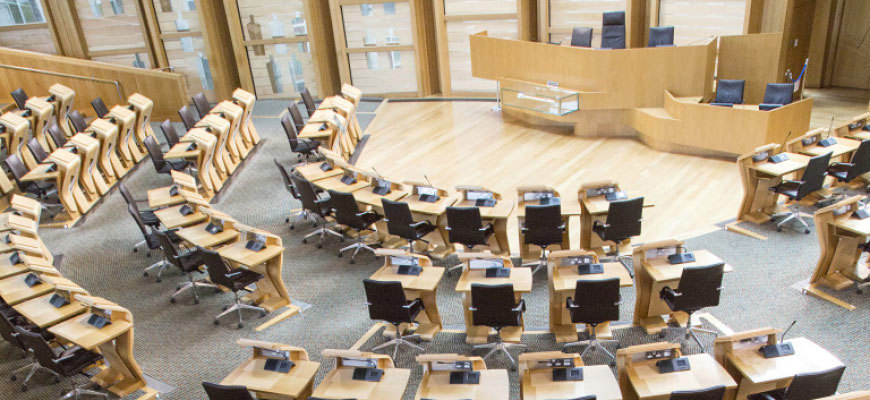Bill with a high price

There is “still a sense of shock and unease” within the Law Society of Scotland at some of the provisions of the Regulation of Legal Services (Scotland) Bill, according to now Past President Murray Etherington.
Opening a Society webinar shortly before the end of his presidential term, Etherington pointed to the Society’s record of strong regulation, which was something to be proud of but which the bill would “drastically undermine”. The new ministerial powers of direct intervention were “deeply alarming”; the profession has a powerful voice and he urged all members to write to their MSPs with their concerns.
Reputational threat
Chief executive Diane McGiffen followed by underlining the Society’s alarm. The bill, she said, “risks breaking something that works”. Particular concerns surround s 20, which allows ministers to issue directions to a regulator, or impose unlimited fines, or change or remove some of their functions; and s 49, making provision for direct regulation by ministers of legal businesses – bringing “unprecedented levels of political control and interference over many of those who work to hold the politically powerful to account”.
It was astonishing, McGiffen continued, that the Government’s answer to the concerns over Roberton’s proposed independent regulator was for ministers to have these powers.
Apart from the threat to its independence, this would damage the hard won international standing of the Scottish legal sector, and its competitiveness.
“What is the point of an independent regulator if you don’t allow them to regulate independently?” she asked.
The bill could still be an opportunity for “real, positive, longlasting change” – but even with complaints, where substantial reform is needed, it is inadequate: the present regime often ties the Society’s hands, and it was “frustrating” to see so many of the Society’s ideas left out, despite much direct engagement with Government. “We can’t afford to get this wrong”, she concluded. “On the contrary, a lot is riding on us getting this right.”
Serious flaws
Executive director of regulation Rachel Wood went into more detail on certain provisions.
She was pleased to see entity regulation, restrictions on using the title “lawyer”, and strengthening of the Regulatory Committee all provided for. Entity regulation would enhance the present system, enabling regulation of a business and all its employees collectively, with a focus on wider consumer protection and confidence. It will become an offence to provide legal services for reward if a business is not authorised by the Society.
She highlighted further concerns, however. Rules for authorised legal businesses – solicitor-owned law firms – will require ministerial approval as well as that of the Lord President, “a direct interference by the state”. It could not be compared with the English system, she said in answer to a question, but was “much more extreme… I’m not aware of anything similar in any modern democracy”. Other difficulties include that the bill imports the “narrow, flawed definition” of legal services in the 2010 Act ABS regime – as a result, a solicitor firm would be unable to provide estate agency or incidental financial business services without these being separately regulated, a significant added cost.
The omission from the bill of registered foreign lawyers meant that the Society would be unable to authorise any of our big firms, with their cross-border operations, under the entity regulation regime – to practise in Scotland! (The Government has said this was “inadvertent”, so amendment should be forthcoming.)
And new restrictions on granting waivers in relation to any rule relating to conduct – why is unclear – would effectively make it impossible for the Society to operate any waiver provision in its rules.
On complaints, there are provisions freeing the SLCC from some of its present constraints, but nothing to help the Society deal with conduct complaints more quickly and efficiently.
Make some noise
Winding up, the President referred to the press interest in the Criminal Justice Bill, in contrast to a complete lack of enquiries about this measure – though it goes to the heart of the independence of the legal sector. It’s why we “need to try and create some noise on this”, he concluded.
Roberton still on the radar
Holyrood’s Equalities, Human Rights & Civil Justice Committee has issued a call for views as it begins its scrutiny of the Regulation of Legal Services Bill – highlighting its interest in the Government’s decision not to follow the Roberton review’s principal recommendation.
The MSPs want to understand what impact the bill will have on legal regulators, service providers and consumers, and whether developing the existing framework carries a risk of potential conflict of interests.
Other topics they seek views on include the level of complexity or simplicity of the current regulatory landscape; the measures open to ministers in reviewing regulator performance; the deficiencies in the complaints system and the proposed changes; the impact of the bill on alternative business structures; entity regulation; and regulation of the
term “lawyer”.
It is unlikely that the committee could bring about such radical amendment that it would change the Government’s approach of regulation by the professional bodies; but it can decide whether or not to approve the general principles of the bill in its stage 1 report.
The call for views is on the Parliament’s website. Responses are due by 9 August 2023.
Perspectives
Features
Briefings
- Criminal court: Dangerous or careless?
- Corporate: Bill gives CMA consumer enforcement powers
- Agriculture: A question for the Land Court?
- Intellectual property: Who owns AI generated copyright?
- Succession: Variation by an attorney?
- Sport: Participation in LIV Golf ruled out of bounds
- Scottish Solicitors' Discipline Tribunal: June 2023
- Data protection: Meta's mega matter
- In-house: Scanning wider horizons






